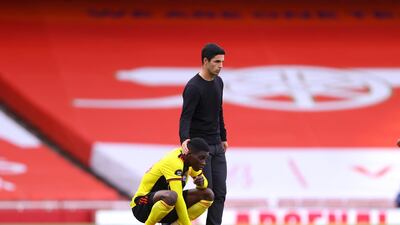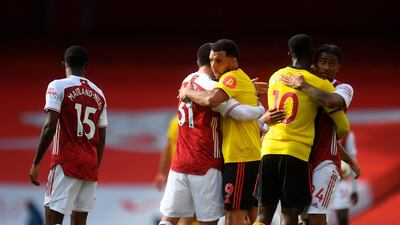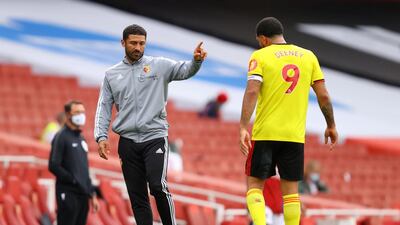As an attacker, Troy Deeney’s game is rarely built on subtlety. A direct force is a similarly blunt talker. “Ultimately we have not been good enough, there's no point dancing around it," said the Watford captain after relegation was rubber-stamped at Arsenal.
There is a temptation to dispute part of his analysis. Watford were good enough to overwhelm Liverpool 3-0, ending their chances of becoming Invincibles, and to become the only team to beat both the eventual champions and Manchester United in the Premier League.
The 1.25 points per game they averaged under Nigel Pearson would, if replicated over a whole season, have earned them 47, putting them level with Crystal Palace and 13 above the actual bottom three. In the final reckoning, however, Watford were both good enough to stay up and deserving of the drop.
If the worst relegations are the most embarrassing and the most avoidable, Watford’s ticked both boxes. From going 5-0 down in 18 minutes at Manchester City, and conceding eight in total, to becoming the first club to sack three managers in a Premier League campaign, there was ignominy aplenty.
And yet the reality that Watford had safety within their grasp made their demotion preventable. FA Cup finalists and 11th-place finishers a year earlier, they effected a swift and ungainly transformation from deserving overachievers to basket-case club.
Perhaps it shows how precarious the life in the Premier League can be. The chances are that Watford attracted little sympathy from neutrals on Sunday: it is a consequence of the managerial revolving-door policy and, in particular, the decision to sack Pearson with two games to go.
No club’s essential duty is to neutrals, admittedly, and the suggestions are that Watford wished they had been more ruthless with Javi Gracia and dismissed him last summer.
And no model is perfect. Bournemouth came up alongside Watford in 2015, stuck with their manager and went down on the same day. Bournemouth's net spend in that period was substantially higher but their loyalty to Eddie Howe may have elicited more understanding.
But if Watford forged a reputation for brutal but correct decision-making that feels lost amid the ruins of a wretched season, reappointing Quique Sanchez Flores was an error. So, too, trusting their fate in the hands of the luckless caretaker Hayden Mullins against City and Arsenal. The ends had tended to justify the means for the Pozzos, but not now Watford have ended up in the Championship.
Previous seasons had suggested they were expert traders, even if the rapid recycling of players between their various clubs may have come at the cost of an identity. Yet the squad that went down had clear deficiencies.
Expect Premier League predators to raid the midfield for the hugely gifted Ismaila Sarr and the much-admired Abdoulaye Doucoure plus, when he is fit again, the mercurial Gerard Deulofeu.
Yet in attack, Watford struggled to find a way of playing that did not revolve around Deeney. A 37-year-old goalkeeper, in Ben Foster, had too many damage-limitation tasks. There was too little quality in the defence and, with Watford possessing the second-oldest squad in the Premier League, insufficient focus on the future. Owners who were quick to fire others for their failings should consider their own culpability.
Certainly the talk of whether Zlatko Dalic or Claude Puel will become their 13th manager in eight years feels as irrelevant as the debate if Pearson qualifies for his £1 million (Dh4.7m) survival bonus.
Watford require a rethink and a reset. An ethos started to feel wrong as mistakes were made, costing them their Premier League status and, very probably, their finest players.













